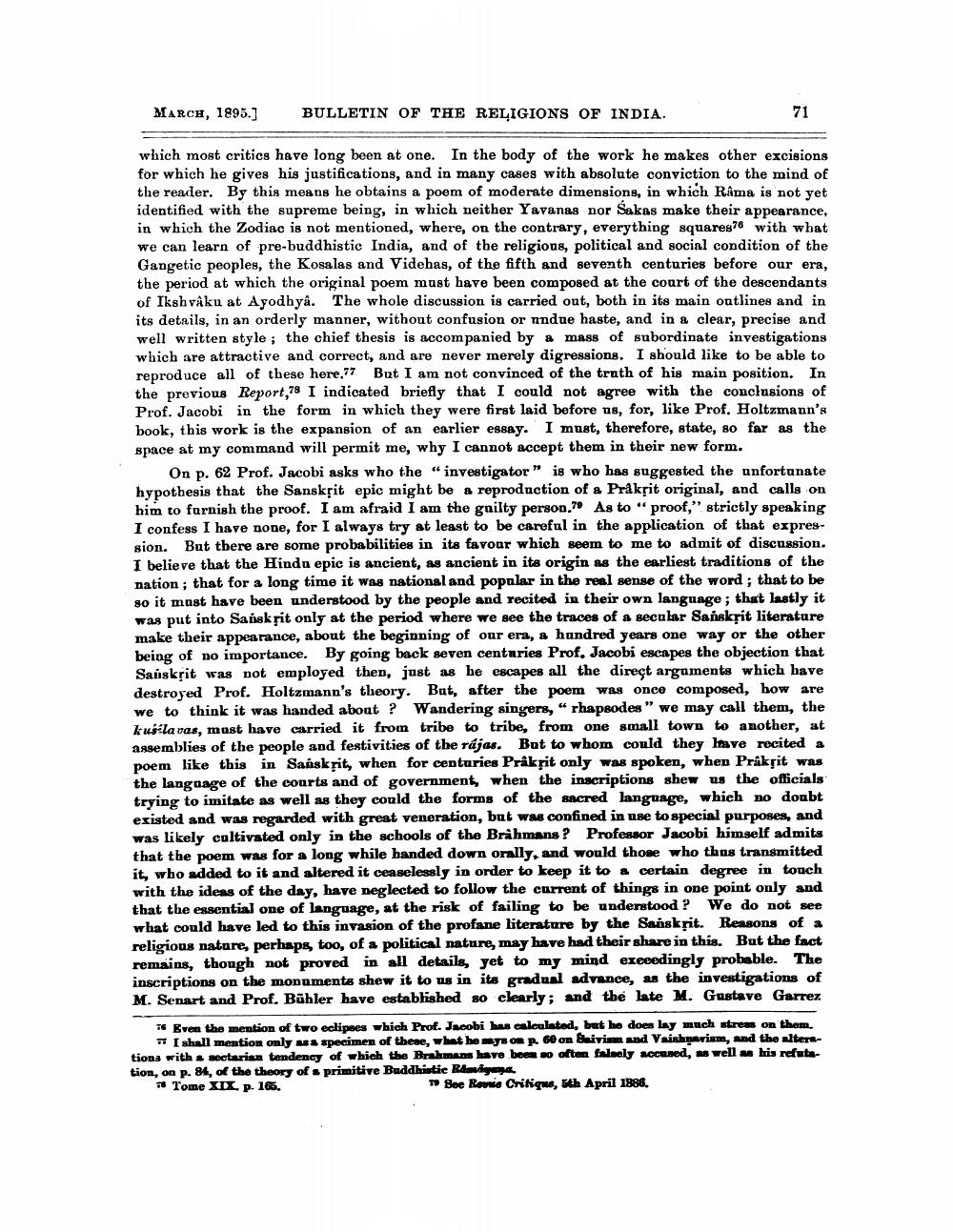________________
MARCH, 1895.)
BULLETIN OF THE RELIGIONS OF INDIA.
71
which most critics have long been at one. In the body of the work he makes other excisions for which he gives his justifications, and in many cases with absolute conviction to the mind of the reader. By this means he obtains a poem of moderate dimensions, in which Rama is not yet identified with the supreme being, in which neither Yavanas nor Sakas make their appearance, in which the Zodiac is not mentioned, where, on the contrary, everything squares76 with what we can learn of pre-buddhistic India, and of the religious, political and social condition of the Gangetic peoples, the Kosalas and Videhas, of the fifth and seventh centuries before our era, the period at which the original poem must have been composed at the court of the descendants of Iksh vâku at Ayodhya. The whole discussion is carried out, both in its main outlines and in its details, in an orderly manner, without confusion or undue haste, and in a clear, precise and well written style; the chief thesis is accompanied by a mass of subordinate investigations which are attractive and correct, and are never merely digressions. I should like to be able to reproduce all of these here.77 But I am not convinced of the truth of his main position. In the previous Report,78 I indicated briefly that I could not agree with the conclusions of Prof. Jacobi in the form in which they were first laid before us, for, like Prof. Holtzmann's book, this work is the expansion of an earlier essay. I must, therefore, state, so far as the space at my command will permit me, why I cannot accept them in their new form.
On p. 62 Prof. Jacobi asks who the “investigator " is who has suggested the unfortunate hypothesis that the Sanskpit epic might be a reproduction of a Praksit original, and calls on him to furnish the proof. I am afraid I am the guilty person.7" As to "proof,” strictly speaking I confess I have none, for I always try at least to be careful in the application of that expression. But there are some probabilities in its favoar which seem to me to admit of discussion. I believe that the Hindu epic is ancient, as ancient in its origin as the earliest traditions of the nation; that for a long time it was national and popular in the real sense of the word ; that to be so it must have been understood by the people and recited in their own language; that lastly it was put into Sanskrit only at the period where we see the traces of a secular Sanskrit literature make their appearance, about the beginning of our era, a hundred years one way or the other being of no importance. By going back seven centuries Prof. Jacobi escapes the objection that Sauskřit was not employed then, just as he escapes all the direct arguments which have destroyed Prof. Holtzmann's theory. Bat, after the poem was once composed, how are we to think it was handed about ? Wandering singers," rhapsodes " we may call them, the kus la vas, must have carried it from tribe to tribe, from one small town to another, at assemblies of the people and festivities of the rájas. But to whom could they have recited a poem like this in Sanskrit, when for centuries Prakpit only was spoken, when Prakṣit was the language of the courts and of government, when the inscriptions shew us the officials trying to imitate as well as they could the forms of the sacred language, which no doubt existed and was regarded with great veneration, but was confined in use to special purposes, and was likely cultivated only in the schools of the Brahmans? Professor Jacobi himself admits that the poem was for a long while handed down orally, and would those who thus transmitted it, who added to it and altered it ceaselessly in order to keep it to a certain degree in touch with the ideas of the day, have neglected to follow the current of things in one point only and that the essential one of language, at the risk of failing to be understood? We do not see what could have led to this invasion of the profane literature by the Sanskrit. Reasons of a religious nature, perhaps, too, of a political nature, may have had their share in this. But the fact remains, though not proved in all details, yet to my mind execedingly probable. The inscriptions on the monuments shew it to us in its gradual advance, as the investigations of M. Senart and Prof. Böhler have established so clearly; and the late M. Gustave Garrez
16 Bven the mention of two eclipses which Prof. Jacobi has calculated, but he does lay much stress on them.
1 I shall mention only us specimen of these, what he myson . 60 on Bivim and Vaishnavism, and the altertions with sectarian tendency of which the Brakmans have been so often falsely accused, as well as his refuta tion, on p. 84, of the theory of primitive Buddhistic Rings Tome XIX p. 16.
* Bee Revia Critique, 5th April 1886.




